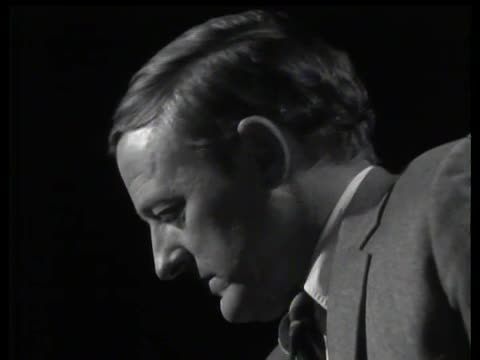The Dissenters; 4; William F. Buckley, Jr.
- Series
- The Dissenters
- Episode Number
- 4
- Episode
- William F. Buckley, Jr.
- Producing Organization
- WGBH Educational Foundation
- Contributing Organization
- Library of Congress (Washington, District of Columbia)
- AAPB ID
- cpb-aacip-512-w37kp7vt86
- NOLA Code
- DSNT
If you have more information about this item than what is given here, or if you have concerns about this record, we want to know! Contact us, indicating the AAPB ID (cpb-aacip-512-w37kp7vt86).
- Description
- Episode Description
- William F. Buckley Jr., 41-year-old editor of the "National Review," syndicated columnist, television personality, former candidate for Mayor of New York City and one of the leading voices of conservatism in America is interviewed by host Donald Fouser. Buckley, scion of an oil-rich family, was raised and educated in Europe and the United States. A graduate of Yale University, he published his first book "God and Man at Yale" -- a severe critique of the institution -- a year after his graduation in 1950. Although Buckley has been accused of associating with many members of the so-called "lunatic fringe" in his early days as a conservative activist, he has, in recent years, severely criticized such radical right leaders as Robert Welch of the John Birch Society for damaging the conservative image. He has described the Birchers' propaganda themes as "paranoid and unpatriotic drivel." Buckley recently disowned a bid by the Conservative Party to draft him as a candidate for Jacob Javits' Senate seat in the 1960 elections. In his maiden effort as a candidate in 1965, Buckley polled 40,000 votes on the Conservative slate in his unsuccessful bid for the office of Mayor of New York. Buckley's published works include: "McCarthy and his Enemies", a defense of the Wisconsin Senator written with Brent Bozell;"Up from Liberalism"; and "The Unmaking of a Mayor," an account of his campaign. Buckley on graduated income tax: "I think the graduated income tax is an institutional form of continuing class warfare ... You find in the rhetoric of the Left, not that the money is needed, but that they just don't want anybody like HL Hunt to have whatever his income is. Now I think most things about Mr. Hunt are deplorable, but I just don't think it's any of my business to build laws whose function is to victimize somebody that I happen to find totally admirable." Buckley on the role of the federal government: "The principle of subsidiarity says the following: that nothing should be undertaken by government which can be done by a private association and nothing should be undertaken by a higher echelon of government that can be undertaken by a lower echelon ... The federal government has got to exercise a self-inhibiting influence. I think it's rather a pity that Congress doesn't exert itself more and simply cut down the uses of money, or else lease their money-raising facilities to states in order to return money to the state with which they themselves can undertake these functions." Buckley on the war in Vietnam: "We (National Review) have supported the war, not enthusiastically but for different reasons than, say, liberals unenthusiastically support the Vietnam War ... If Vietnam is something to worry about, it is because it is part of a worldwide movement. If it isn't, then we have no more reason purifying the politics of South Vietnam than we do those of "Poppa Doc's" Haiti ... I think there is no question that the invasion of South Vietnam is part of the general exuberance of the communist movement which has to be checked ... (we must) make it quite clear that people don't fuss with the security of the free world with impunity." The Dissenters: William F. Buckley, Jr. was produced for National Educational Television by its Boston affiliate, WGBH-TV. (Description adapted from documents in the NET Microfiche)
- Series Description
- The Dissenters features a series of interviews conducted by host Donald Fouser, which focus on dissenting personalities on the American scene. The topics covered include politics, race, and religion. The 6 half-hour episodes that comprise this series were originally recorded on videotape.
- Broadcast Date
- 1967-10-29
- Asset type
- Episode
- Genres
- Talk Show
- Media type
- Moving Image
- Duration
- 00:30:59
- Credits
-
-
Producing Organization: WGBH Educational Foundation
- AAPB Contributor Holdings
-
Indiana University Libraries Moving Image Archive
Identifier: cpb-aacip-15494fa58f6 (Filename)
Format: 16mm film
-
Library of Congress
Identifier: cpb-aacip-db70856136a (Filename)
Format: 1 inch videotape: SMPTE Type C
Generation: Master
Duration: 0:28:57
-
Library of Congress
Identifier: cpb-aacip-816f9f8a29e (Filename)
Generation: Copy: Access
Color: Color
-
Library of Congress
Identifier: cpb-aacip-03c69a20c7c (Filename)
Generation: Master
Color: Color
-
Library of Congress
Identifier: cpb-aacip-b0337d2e38f (Filename)
Format: U-matic
Generation: Copy: Access
Duration: 0:28:57
-
Library of Congress
Identifier: cpb-aacip-eb3efeff2a4 (Filename)
Format: 2 inch videotape
Generation: Master
Duration: 0:28:57
-
Identifier: cpb-aacip-119f40ed705 (unknown)
Format: video/mp4
Generation: Proxy
Duration: 00:30:59
If you have a copy of this asset and would like us to add it to our catalog, please contact us.
- Citations
- Chicago: “The Dissenters; 4; William F. Buckley, Jr.,” 1967-10-29, Library of Congress, American Archive of Public Broadcasting (GBH and the Library of Congress), Boston, MA and Washington, DC, accessed February 7, 2026, http://americanarchive.org/catalog/cpb-aacip-512-w37kp7vt86.
- MLA: “The Dissenters; 4; William F. Buckley, Jr..” 1967-10-29. Library of Congress, American Archive of Public Broadcasting (GBH and the Library of Congress), Boston, MA and Washington, DC. Web. February 7, 2026. <http://americanarchive.org/catalog/cpb-aacip-512-w37kp7vt86>.
- APA: The Dissenters; 4; William F. Buckley, Jr.. Boston, MA: Library of Congress, American Archive of Public Broadcasting (GBH and the Library of Congress), Boston, MA and Washington, DC. Retrieved from http://americanarchive.org/catalog/cpb-aacip-512-w37kp7vt86
